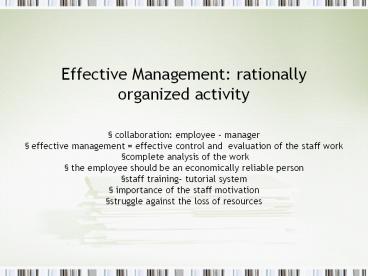Effective Management: rationally organized activity - PowerPoint PPT Presentation
1 / 19
Title:
Effective Management: rationally organized activity
Description:
collaboration: employee - manager effective management = effective control and evaluation of the staff work complete analysis of the work – PowerPoint PPT presentation
Number of Views:78
Avg rating:3.0/5.0
Title: Effective Management: rationally organized activity
1
Effective Management rationally organized
activity
- collaboration employee - manager
- effective management effective control and
evaluation of the staff work - complete analysis of the work
- the employee should be an economically reliable
person - staff training- tutorial system
- importance of the staff motivation
- struggle against the loss of resources
2
Effective management
- Effectiveness dedication/endeavor/ and minimum
effort/no hurry - Strict coordination between the different work
teams - Clear idea about near, far horizon
- Knowledge of human resources
- Order, discipline, general values set in the
rules on the workplace
3
Mary Parker Follets doctrine Human relations
- Main goal Research on the effective work of the
employee - Factors
- - individual particularities
- - work team
- - development of personal qualities
- - solving problems skills
- - respect for the employee. The Howtorn
Effect.
4
Self-motivation and Motivation of the work team
- Aspirations The condition to need something
- Motif Reason for activeness
- Aspirations according Abraham Maslow
1/physiological, 2/ for security and safety
reasons, 3/social - respect and mutuality,
approval, liking, 4/knowing yourself and 5/
actualization
5
Work Needs
- From salary, good conditions for work, food,
heating - No punishments, financial bonuses
- Good relations with the director, friendly
relations, groups - Recognition in work, stimulation, authority in
your work - Creative development, advancement
6
Stages in Development
- Introducing the new worker to the work
environment professional obligations,
psychological challenges, personal qualities,
colleagues, tutors - Formation of necessary qualities teamwork,
discipline, subordination, self-preparation,
engagement in the work team - Training acquisition of new knowledge. Nowadays
pragmatically-orientated, theoretic knowledge
skills/for team work, conflict-solving,
professional advice, collaboration
7
Stimuli for affirmative behaviour in the firm
- Awards/money, moral- gratitude, praise, holiday,
family award, award with a spiritual product - Punishment, remark, reprimand, negative judgement
- Work with kind people, good director
- Personal satisfaction of the work
- Complexity satisfying environment and work
8
Staff Development
- Nature the quality of the work accomplished
depends on the knowledge and skills training - Forms Training of the young workers, their
permanent education according to categories
9
Staff recruitment
- Choice criteria skills, experience, abilities,
social skills - Seeing the documents of the candidates
- Preliminary meeting - sifting of the
non-appropriate ones - Real interview
- Test understand the intelligence,team work,
professional skills. It can be in the form
jury-candidate - Decision of the manager for the choice of the
convenient candidate
10
Job Interview- Requirements
- Good knowledge of the candidates documents
- Nice atmosphere of the interview
- Candidates are called one after the other
- Preliminary questions they can be basic and
secondary. Basic about the work, qualification,
motivation. Check the preliminary expectations
for the position, their suitability and
seriousness. - The jury discusses and takes a decision. The
good choice should be based on qualification,
personal abilities, motivation, personal
characteristics, desire to work in a team, solid
education
11
How to form a good staff
- Training - according to the tasks of the
organization trustworthy people - Important question what type of people do we
need? Table of the staff present - Analysis of the work environment workplace and
activities - Model of the negatives at the moment/redundant
people, re-organization of the workplace,
necessary resources
12
Good work characteristic
- Obligations
- Professional risks
- Materials and techniques
- Psychological portrait
- Qualification, experience
- Chance for carrier development
- Expected behavior
- Motivation for work
13
Conflict solving
- Conflict Clash of interests
- Usefulness shows a non-solved problem
- Paradox of the conflict fear, the staff hide the
conflicts, relative calmness on the surface
14
Types of conflicts
- Personal Clash of motifs, exterior cause,
interior contradictions - Interpersonal difference in interests, values,
opinions. Rivalry. Difference in knowledge,
level, qualification - Inter-group struggle for resources, imposing of
position, differences in values. Hostility,
rivalry, negativity - Concurrence between the firms. Opposition of
values, final product, thinking.
15
Conflict development
- Hidden period
- Awareness of the conflict
- Exterior realization
- Consequences for the staff, the person and work
16
Management of the conflict
- Meeting-hearing. Mediationlooking for an
acceptable decision, collaboration - Mistakes keeping off the differences, avoiding
them, express calmness, imposing the opinion,
reconciliation, compromise
17
Firm culture
- Ability to present yourself in a good light
- Good manners are a key for the person to be well
accepted by the others - They are necessary in a concurrent
environment/etiquette/neutralising conflicts,
outbursts - They are a key to people belonging to different
cultures - Good manners kindness and politeness at the
workplace
18
Steps in firm culture
- Meetings
- Hand shaking
- Small talk listening, non-verbal communication,
understanding and response/empathy - Pluses of understanding we understand the
person, gather information, understand the task,
gain the persons favor - Mistakes interrupting, lack of listening, adding
our words
19
Kind and friendly manners
- Having a guest
- Meeting a colleague
- In the cafe
- Next to the office equipment
- In case of a conflict explanation, without very
personal messages, understanding, good
intentions, collective decisions - Difficult colleagues different tone, politeness
not being rude - The director non-servile behavior to him/her,
as to the director, subordinates are not inferior































